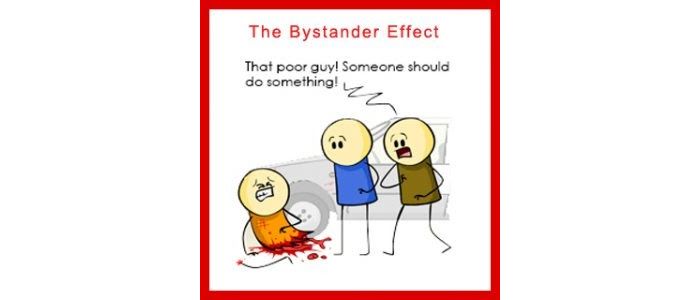Dearest Darling Readers,
A study has found that, as people decide whether to respond to a request for help or not, they first calculate who else is aware of the situation and whether those people will be more helpful or more relevant in help.
For example, a few days ago when Pune was lashed with rains, I saw a car with a punctured tyre, stranded by the roadside. I immediately thought, “I shouldn’t stop, since I don’t know how to repair the puncture or to change the tyre.” I kept driving. The fact is, I could have helped by offering a ride or lending a spare tire or just chatting till help arrives.
This reluctance to help or this failure to help is credited to a phenomenon called ‘The bystander effect’.
The drowning death of a man named Raymond Zack in 2011, also shows this type of mental evaluations and reluctance to help. Firemen, police officers, and dozens of bystanders kept looking while Zack drowned because none of the authorities made efforts to save him.
Firefighters expected the police officers to save him while police officers thought it is the firefighter’s job. When a pedestrian bystander took the initiative to save the man herself, she was told not to because “the authorities would take care of the situation.” Everybody stood by and nobody saved Raymond Zack.
I can imagine the family members of Raymond Zack wondering why NO ONE stepped in, to save him.
I can imagine the gentlemen with the punctured tyre, looking at hundreds of cars crossing him without stopping and wondering why NO ONE was stopping, to help him out.
I can understand you saying, “Come on naren. 1000s of people need help. How can we stop to help ‘everyone’? It is not practical.” Yes indeed, I can see where you are coming from. However, for a few minutes, just think about what do we stand to lose if we reach out? And yes, what do we gain when we succeed to reach out!
Rati Forbes, an outstanding person, was sharing with us about her mother who was a very well-known Pediatrician in Mumbai. Every Tuesday, she would go the hutments and the bastis and see the poorest of poor patients there. There were hundreds who would turn up every day.
Would it be right if Rati’s mother had thought, “There are 100s of 1000s of poor people who need my help. I cannot reach out to all of them. So, let me not attempt to reach out to even a few hundred.” Ahaa! That would be ‘The bystander effect’.
Some people remain unaffected by ‘The bystander effect’. Like Rati’s mother.
They do what must be done without bothering about ‘Do I have enough money / time / energy etc?
They do what must be done without bothering about ‘Is it their responsibility or is it someone else’s responsibility?
They do what must be done without bothering about ‘success or failure’.
These people are tuned to their conscience. They listen to the voice of their conscience.
They want to hold their heads high rather than hide their eyes from themselves.
This world is beautiful because of people like these. A big salute to all such people. Grab an opportunity around you. May you and me too join the league of these amazing people. In this direction, here are two of our initiatives…
Would love to know about your initiatives and the role we can play in supporting you.
With love, prayers and exceptional wishes,
naren
Imagine, when we wake up, we are given only what we had thanked for.
Watch inspirational videos
Read more Life School Messages

